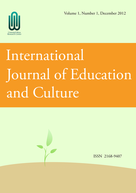


Volume 12 Issues 3-4 (2023-12-31)
Volume 12 Issues 1-2 (2023-06-30)
Volume 10 Issues 1&2 (2021-06-30)
Volume 9 Issues 3&4 (2020-12-31)
Volume 9 Issues 1&2 (2020-06-30)
Volume 8 Issues 3&4 (2019-12-31)
Volume 8 Issues 1&2 (2019-06-30)
Volume 7 Issues 3&4 (2018-12-31)
Volume 7 Issues 1&2 (2018-06-30)
Volume 6 Issues 3&4 (2017-12-31)
Volume 6 Issues 1&2 (2017-06-30)
Volume 5 Issues 3&4 (2016-12-31)
Volume 5 Issues 1&2 (2016-06-30)
Volume 4 Issues 3&4 (2015-12-31)
“Character is what you do when no one is watching” so the wise sages say. In the relatively new cyber world who is really watching? Data indicates that in the anonymous realm of the cyber-space, people feel invisible and thus may act in a manner that they normally would not in person. Many times this behavior involves illegal or often times violent actions. Cyber-bullying has become an epidemic, affecting schools and workplaces alike. This paper discusses the ethical principles of cyber conduct and the issue of positive cyber-citizenship. Cases of cyber related violence are increasing at an alarming rate and school age children are using computers and the internet to inflict damage and harm to others. Attention is being given to school violence occurring through the use of firearms, however damage and injury is being inflicted on far greater numbers of school age children through the use of computers. These acts, whether as a result of mischief or intentional desire to cause injury, need to be studied and understood, and principles of cyber ethics need to be adopted.
Entrepreneurial qualities enhance individuals’ adaptation for both physical and social environment. Entrepreneurial qualities are acquired through the process of lifelong learning and developed within certain social environment. However, previous studies were far from examining the influences of social environment on the development of entrepreneurial qualities. Therefore, this study examines the entrepreneurial qualities of students of different socio-cultural backgrounds with the aim of identifying the courage and constraint factors for the development of entrepreneurial qualities. Mixed research design has been employed to corroborate information generated through discussion sessions and responses of 310 students. Involvement of students in the real operation of activities highly motivate them to achieve unsatisfied needs; to be moderate risk taker, opportunity seeker, needy for independence, self-esteem and to control their own destiny and to become more creative or/and innovative. Except need for independence, the levels of other six entrepreneurial qualities were higher with better freedom in expressing one’s own feeling in a family. However, social environment allowing individual freedom is very less and limited to some family groups. Therefore, the social environment inviting students’ practical involvement, freedom of expression and interaction with practitioners and entrepreneurs should be enhanced. The entrepreneurial orientation of the content and methods of teaching and exposure for potential local resources of students should be enhanced.
Economic crisis is a quite recent social phenomenon, which has affected all aspects of life all over the world. As a result, the family system could not stay unaffected. Many Greek families changed their whole way of living, trying to adjust themselves to the new circumstances (unemployment, wages reduction, immigration or moving etc.) resulting from the crisis. The purpose of the present research is the study of children’s perceptions through their drawings about their families in the middle of crisis. The sample is consisted of children, aged between four and eleven years old, coming from nuclear families. The important point about the families of the children-participants in this research is that one of the parents or both of them are unemployed. The families of the children of the sample can be characterized as families in the middle of crisis, because at least one of the parents got unemployed almost during the period when the research was conducted. Last but not least, concerning the method, the psychometric tools which were given to each child were two kinds of drawings: (1) Corman’s static family drawing and (2) Burns & Kauffman’s kinetic family drawing. Concluding, the present study is focused on the roles and functions in a family and the dynamics between the family members through the lens of the children's drawings.
CALL FOR PAPERS/PROPOSALS
CALL FOR BOOK EDITORS